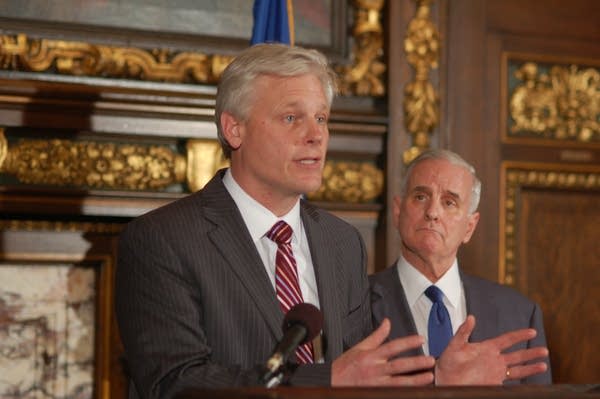Minnesota budget deal: Higher taxes for top earners, smokers
Go Deeper.
Create an account or log in to save stories.
Like this?
Thanks for liking this story! We have added it to a list of your favorite stories.

Minnesota would have the fourth highest income tax rate in the nation under a deal reached by Gov. Mark Dayton and DFL legislative leaders.
• Video: Lawmakers announce tax plan
• Tell us: Your thoughts on the tax plan?
The new fourth-tier income rate is part of an overall tax plan announced Thursday night. But the plan, which raises $2 billion in new revenues, also drops some key tax increase proposals that were on the table earlier this week.
Turn Up Your Support
MPR News helps you turn down the noise and build shared understanding. Turn up your support for this public resource and keep trusted journalism accessible to all.
The deal sets the stage for the session to end on time by Monday night.
Under the plan, Minnesota's top 2 percent of earners will see their income taxes go up. Smokers will pay more for a pack of cigarettes. Some corporate taxes will go up and some business-to-business services will be subject to the sales tax.
Dayton, DFL House Speaker Paul Thissen and DFL Senate Majority Leader Tom Bakk hashed out the deal to erase a $627 million budget deficit, increase funding for education and provides property tax relief. Dayton said the plan is good for the state and follows through on DFL campaign promises.
"The investment is in education: We promised that and we're delivering. Property tax relief: We promised that. We're delivering. Jobs and economic development: We promised that and we're delivering. We have to take care of the deficit. We've done so, straightforward. No gimmicks, no games. Honest accounting," Dayton said.
The plan also drops some measures that were championed by House Democrats. Key among them was an increase in alcohol taxes. Thissen says he also dropped a push for a temporary income tax surcharge on couples earning more than $500,000 a year. That money would have been used to pay back a K-12 school payment shift that was used to balance earlier budgets. Thissen said there were concerns about how high taxes would have to go to raise the $800 million.
"As we looked at the whole of the package, it became clear that some of the discomfort over the additional income tax needed for the surcharge to fully pay back our schools was growing. That will no longer be part of the package," Thissen said, adding that he's hoping the shift gets paid back as unexpected revenues come into the state - a provision under current law.
The tax bill also includes financing to help Rochester handle the planned expansion of the Mayo Clinic.
The deal on the tax bill comes four days after Dayton and DFL leaders announced an overall budget framework. Since then, the tax conference committee continued to spar over details of the overall tax plan.
Bakk says he thinks the deal will pave the way for lawmakers to finish their work before Monday's constitutional deadline to adjourn.
"This is the linchpin of the session. Now everything will fall in under the tax bill. We're well on our way and I would argue ahead of schedule to accomplish a completion of the tax bill on Thursday before the end of session," he said.
The plan would give Minnesota the fourth highest income tax rate in the nation behind California, Hawaii and Oregon. The cigarette tax - which would increase $1.60 a pack to $2.83 - would give Minnesota the sixth highest tobacco tax in the country.
Republicans argue that the tax hikes are unnecessary.
"We've got a $600 million problem. You don't need to raise $2 to $3 billion in revenue to solve a $600 million problem. With all due respect to the governor and his plan, yes he's keeping a commitment but it's not anything that will be good for the people of the state," said GOP Senate Minority Leader David Hann.
The House and Senate will have to work around the clock to finish their work on Monday. DFL leaders say they plan to meet every day to complete their budget before Monday's constitutional deadline to adjourn.
Dear reader,
Political debates with family or friends can get heated. But what if there was a way to handle them better?
You can learn how to have civil political conversations with our new e-book!
Download our free e-book, Talking Sense: Have Hard Political Conversations, Better, and learn how to talk without the tension.




